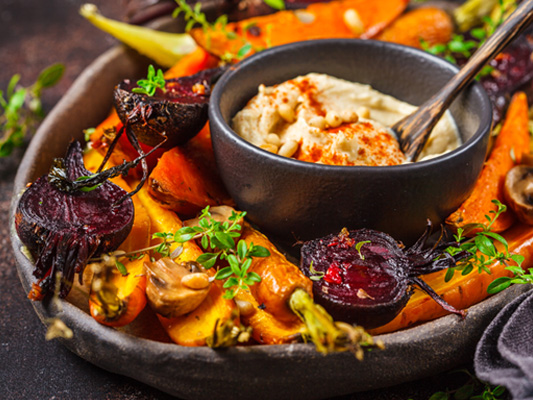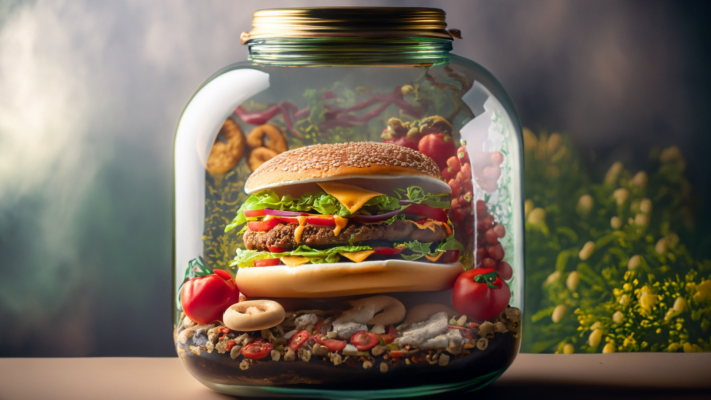Feeding Curiosity: Mind Hunger and Sweetness of Satisfaction
I love to read labels! All kinds of labels. I’m not even sure why – maybe I just like knowing what’s going into my body, on my skin, or around my house? Who knows! Funny thing is, my sister’s the same way, so maybe it runs in the family? 😆 And it doesn’t stop there. I also love diving into all sorts of research about food. I mean, it’s sort of cool to know that when I’m munching on a cup of blueberries, I’m not only enjoying a tasty snack, but I’m also getting 24% of my daily vitamin C. It makes me feel like I’m in the driver’s seat, as if I really know what my body needs each day.
You see, if I research the benefits of a particular “superfood”, learning about all the good things it is supposed to do to my body and all the nutrients and vitamins it could provide, intrigued, I am more excited to add it to my diet. Often I get super excited if it is something I have never tried before, like some colorful, juicy tropical fruit, for example. And even though I don’t feel physically hungry, in anticipation, I’m always eager to try it out. This curiosity and anticipation are prime examples of “mind hunger” – the powerful psychological phenomenon that drives our food choices based on the knowledge and beliefs we carry about different foods rather than our actual physical needs.
So, what’s going on inside our heads when we experience mind hunger? Unlike physical hunger, which is driven by the body’s need for energy and nutrients, mind hunger is rooted in our emotions, thoughts, and surroundings. Sometimes it’s stress, boredom, or sadness that nudges us toward the fridge. Other times, it’s the sight or smell of a delicious treat that makes us forget our full bellies and dive right in.

Food for Thought: The Emotional and Social Appetites of Mind Hunger
You know, it’s like when you’re at a party, just hanging out and having a good time with friends. The room is filled with laughter and the mouth-watering aroma of fresh pizza. Sure, you already had dinner, but as the pizza is passed around, you can’t help but grab a slice (or two). This is how our brain picks up on social vibes and can totally override our physical hunger signals. We’re social creatures, after all, and food is like a secret handshake that brings us closer together. Sharing a meal with friends or family can make us feel connected and happy, so it’s no wonder our brains sometimes put these good vibes before our body’s nutritional needs.
And don’t get me started on mind hunger’s little trip down memory lane! Like when you picture your grandma’s homemade cookies, still warm from the oven, filling the house with their irresistible aroma. For many of us, these sensory memories are so powerful that even thinking about grandma’s cookies can set off a craving. This mental link between food and memories can be a double-edged sword. Sure, it can evoke feelings of nostalgia and happiness, but it can also lead to emotional eating when we try to recreate those cozy moments through food.
When we’re looking through the lens of mind hunger, it’s essential to recognize the impact of cultural influences on our eating habits. Food is a major part of our cultural identity, and it can shape our likes, dislikes, and even our sense of belonging. Take Italian families, for example, where food is like a love language, and turning down a second helping might be seen as rejecting that affection. In Japan, the art of sushi-making showcases the importance of precision, beauty, and respect for ingredients, which can influence people’s attitudes toward food and its preparation.
In other cultures, certain foods hold symbolic meaning and are eaten on special occasions (whether you’re hungry or not), which just adds to the emotional connection we have with those dishes. Think about the Chinese New Year, when families gather to enjoy a feast that includes dishes like dumplings and fish, symbolizing wealth and abundance. Or consider the Ukrainian tradition of greeting guests with bread and salt, which represents hospitality and a warm welcome; breaking bread is a powerful act of connection and unity.
These deep-rooted connections we have with food go beyond mere sustenance and weave themselves into the fabric of our cultural identity. So, it’s no surprise that mind hunger can be influenced by the rich array of food traditions and memories that define our lives.

Superfoods and Guilty Pleasures: How Thoughts Shape Our Cravings
Our thoughts and beliefs about food play a significant role in shaping our cravings and eating habits. The information we gather through various sources like articles, documentaries, or even conversations can mold our perception of what’s healthy or indulgent, leading to mind hunger.
You know, it’s like the hype around certain claimed to be “superfoods”, like quinoa, kale, or acai berries. The constant exposure to information about their potential nutritional benefits can make us crave these foods, even when we’re not physically hungry or haven’t tried them before. This is mind hunger at work – your brain’s response to the knowledge you’ve gained about these foods, prompting you to eat them, even if you might have difficulty digesting it.
On the other hand, how many times you’ve just devoured a slice of pizza or cake and suddenly got overwhelmed with guilt for eating something “unhealthy.” Well, you’re not alone! This mindset, driven by our thoughts and emotions, can create a tricky relationship with food that’s often rooted in our psychological hunger—our “mind hunger.”
Mind hunger is all about how our thoughts and what we learn to shape our food choices. It’s those little voices in our head saying things like:
“Hey, I should eat more fiber!”
“I worked my butt off today; I’ve earned that pizza.”
“I read a blog that said I should walk 10,000 steps a day to be healthier.”
Avocados are amazing, right? They’re full of good fats and vitamins.”
“Processed meats might not be the best choice with all that sodium and those preservatives.”
“Ugh, if I skip a workout, does that mean I have no self-discipline?”
Our mind hunger is influenced by everything we see and hear, like all those recipe websites we browse and the countless fitness tips we come across. We’re constantly taking in information that feeds our mental cravings, and it all plays a part in how we make decisions about food and exercise.

The Food Fad Rollercoaster: Good vs. Bad and Everything in Between
Mind hunger is all about those extremes and contrasts we tend to create around food – you know, the whole “good” vs “bad” thing, and deciding what we should or shouldn’t eat.
You know how it goes: One-day eggs🥚 are amazing, the next they’re off-limits because of cholesterol, and then suddenly they’re back in style with their rockstar protein and vitamins. Same thing happened with butter: It was a must-have, then margarine took over as the “healthier” option. But guess what? We figured out trans fats in margarine are bad news, and now butter’s making a comeback.
And don’t even get me started on coffee ☕️ ! It used to be the ultimate no-no because of caffeine, but now studies say it might actually be good for us in moderation, like boosting our brainpower and lowering the risk of some diseases.
Remember when fat was public enemy number one, and everything was low-fat this and low-fat that? Well, turns out some fats, like the unsaturated ones, are actually important for our health. And carbs? They were once the foundation of a healthy diet, but then along came low-carb and keto diets, making us rethink our carb choices and focus on the high-quality ones while cutting back on the refined stuff.
Even our beloved berries and fruits 🍓🫐 went through a rough patch because of their sugar content. But now we get it – natural sugars are okay in moderation, and fruits have a ton of health benefits like essential nutrients, antioxidants, and fiber.
I like the Buddhist concept of the middle way, which reminds us not to get too hung up on extreme behaviors, especially when it comes to food. It’s all about striking a balance and not going overboard with your love or fear of certain foods.
You see, so many of us have become obsessed with numbers (calories, carbs, fats, daily values, costs, and so on) when choosing our meals. We end up relying more on reading labels and doing math than trusting our senses. It’s like taste and smell have taken a back seat, since they can’t detect those hidden nutrients that science tells us to be on the lookout for. And let’s not forget, food manufacturers have become pros at masking them!

Mind Over Matter: Anxiety on the Menu
Take a stroll through an American supermarket, and you’ll see what I mean. All those refrigerated, sealed packages with tons of info on the labels have made us forget about our sense of smell and focus more on what we see. It’s no wonder that, with all this food around, we’re the most anxious eaters in the world.
Imagine if we’ve basically pushed our sense of smell to the side and let our minds take over. It’s our minds, not our noses or eyes, that make us feel anxious about food. We think that if we just have all the right, scientific nutritional information, our bodies will eat the perfect diet. But the thing is, these “facts” keep changing with new research and health experts, so we’re constantly worried.
Think of it like being a student who is constantly worried about getting perfect grades. Our minds worry that we’ll make a mistake on an assignment or test without realizing it until we receive our scores. When we let our minds control our eating habits, they’re usually rooted in fear. We get so caught up in what we “should” and “shouldn’t” eat that we forget to actually enjoy the taste of the food we’re eating.
Just like how that student might miss out on truly learning and enjoying the process because they’re so focused on getting perfect scores, we can miss out on savoring our meals when we let our minds take over and obsess about the “right” and “wrong” foods.

The Emotional Rollercoaster of Food Labeling
We’ve all been there—categorizing foods as “good” or “bad” and “healthy” or “unhealthy.” And I bat you know that doing so can fuel an emotional whirlwind around our food choices. When we indulge in “unhealthy” foods, we may feel guilty, ashamed, or anxious. On the flip side, choosing “healthy” options can make us feel proud and accomplished. This emotional tug-of-war is a prime example of mind hunger, as it’s driven by our thoughts and beliefs rather than our body’s genuine needs.
Labeling foods as either good or bad can trap us in a seemingly never-ending cycle of restriction and overeating. Let’s say you treat yourself to “bad” food and end up feeling guilty. You might try to “make up for it” by restricting your food intake, which makes you feel deprived and might spark intense cravings, eventually leading to overeating or bingeing on the foods you were trying to avoid. Plus, when we stick to a diet full of only “good” foods, we may miss out on essential nutrients that our bodies need for optimal health. This can result in malnourishment and increase the risk of nutrient deficiencies.
It’s crucial to remember that there’s no one-size-fits-all “good food” because of our unique biological makeup. What might be nourishing for one person can cause issues for another, thanks to our individual differences and genetic biodiversity. So, it’s essential to listen to our bodies and honor our personal needs rather than adhering to rigid food labels.
Food labeling can also pave the way for food anxiety and disordered eating patterns. When we’re constantly judging our food choices based on perceived healthiness, we might develop an unhealthy obsession with food. These disordered eating patterns can make it difficult for many to recognize and respond to their body’s natural hunger and fullness cues. Instead, they become overly dependent on external rules and guidelines, which may not align with their unique nutritional needs.

Brain vs. Taste Buds: The Power of the Mind Over Food Preferences
You know what’s really mind-blowing? How our brains can totally shape our food preferences! There’s research out there showing that people can be tricked into liking or disliking certain foods just based on some made-up info. Like, imagine scientists telling folks that they got sick after eating strawberry ice cream when they were kids. Crazy, right? But some of these people actually believed that tall tale and even swore off strawberry ice cream for good!
On a more positive note, our minds can also be led to appreciate certain foods. Imagine a study where participants were told they absolutely loved asparagus the first time they tried it. Interestingly, around 40% of those who accepted this idea said they’d be eating more asparagus in the future. It just goes to show how powerful our minds can be when it comes to food! (1)

Water Bottle Wonders: The Trend of Mind-Driven Thirst
You know, it’s been super interesting to see how people’s thirst has been so mind-driven in the past decade. Sometimes it feels like everyone’s carrying a water bottle these days, no matter where they are – in meetings, concerts, or even swimming pools! It’s like we’re all attached to our bottles like they’re baby bottles or something. This whole craze started from a report saying we should be drinking eight to twelve glasses of water a day, and that tea and coffee don’t count because they’re diuretics. So, people got scared they were constantly dehydrated, and suddenly, everyone’s worried about drying out! This led to a huge boom in the bottled water and reusable water bottle industries. I mean, who would’ve thought that just carrying water around could have such a big impact?
But doesn’t it make you wonder how our parents, grandparents, or all the generations before us, for that matter, managed to dodge the dehydration bullet without these modern, high-tech bottles filled with the fanciest “spring water”? Seems like our current-day brains have been so taken in by the so-called “scientific” facts and tips from those glossy magazines that we’ve just up and forgotten the natural smarts of our bodies!
You know, our minds aren’t always right, and they don’t have all the answers. To find balance with eating and truly enjoy our food, it’s super important to listen to the wisdom that’s already inside our bodies.

Mind Hunger’s Helpful Side: Making Informed Food Choices
But hey, don’t get me wrong, the mind is not the enemy here. It can actually be super helpful. Like when you’re reading labels on packaged food to figure out if it’s actual food or just something that looks like it. Or when it tells you to slow down, check in with the Nine Hungers, and really pay attention to what you’re eating. And if you’ve got a medical condition that means you need to be extra careful with what you put in your mouth, like diabetes or celiac disease, your mind can help steer you toward the stuff you need and away from foods that might aggravate your condition.
The real goal here is to have a mind that’s got your back, one that dishes out kind and wise advice while also taking cues from the rest of your body. It’s all about balance, my friends!
You know what else happens quite often? Even when we’re stuffed, our minds often convince us, “Hey, it was so good; one more bite won’t hurt.” Oh, you’ve seen it, right? Maybe it’s Thanksgiving dinner and you’ve just polished off a plate piled high with turkey, stuffing, and all the trimmings. You’re lounging back in your chair, feeling like you’ve swallowed a bowling ball. But then, Aunt Linda brings out her homemade pumpkin pie, and your mind starts whispering, “Well, one little slice won’t hurt.”
There’s this guy, Brian Wansink, who shared a story about patients with amnesia who were told it was dinner time. Even though they had just eaten a full meal half an hour before (and totally forgot about it), they went ahead and ate another whole meal.
In another experiment, they put people in a room full of food and set a clock two hours ahead. The heavier participants ate more frequently, tricked by the clock into thinking it was “mealtime”. But the people with a normal weight didn’t eat as often because they listened more to their bodies’ hunger signals. Quite fascinating, right?

Uncertain Satisfaction: The Mind Hunger Mystery
You know, it’s pretty hard to tell if we can ever truly satisfy our mind hunger since our thoughts about food seem to change all the time. One day, our minds might be all about sticking to a strict diet, and the next, they’re convincing us to treat ourselves to an extra slice of cake. Plus, there’s that pesky inner critic that judges us no matter what we eat or drink.
So, take a sec and think about this – what actually satisfies our mind hunger? A lot of the time, our minds just love to snack on information, news, or juicy gossip. They get a kick out of learning new things and soaking up fresh facts. Picture this: you’re at a fast-food joint, and the table has a placemat with all the nutritional details of your meal. As you munch on a cheeseburger, your mind is busy gobbling up all that info about the burger’s nutrients. Your mind might even feel a bit better knowing that the restaurant now cooks without trans fats. But does that really hit the spot? Well, not quite. And why’s that? It’s because all those ideas about what’s “good” or “bad” to eat keep changing. Remember when margarine full of trans fats was considered healthy and people used to cook with Crisco and lard all the time? Our minds know that what we know about food is always evolving, so they never really feel settled.
The funny thing is, our minds only feel truly content when they chill out. When all those conflicting voices about eating quiet down and we let awareness take the wheel instead of our thoughts, we can be totally present as we eat. And when our minds are brimming with awareness, that’s when we feel truly satisfied.

Our Mind: A Frenemy Worth Keeping
Sometimes, our mind can be a bit of a trickster, leading us astray from what our bodies really need. But hey, our mind isn’t all bad! In fact, it can be a lifesaver by reminding us which foods to avoid when we have medical conditions like kidney failure or diabetes. Plus, our mind can help us practice mindful eating by shifting its focus to the yummy sensations in our mouths or asking, “Hey, how full is our stomach right now?” It can even give us a friendly nudge, like, “You might get hungry later; let’s pack a healthy snack so we don’t have to hit up a fast-food joint.”
So, here’s the thing: as much as I love knowing all the little details about the nutritional value and potential health benefits, I realized a long while ago that the best thing for my body is just to listen to it. Sure, it’s great to have a head full of studies, numbers, and all that “knowledge,” but our bodies have their own wisdom, too! It’s like they’re trying to tell us, “Hey, I know what I need, so trust me!”
How about we aim to strike a balance between being well-informed and tuning in to our body’s own intelligence? After all, it’s all about teamwork between our brains and our bodies, right? And when we work together, we can make the best choices for our health and happiness.
PRACTICES

Cultivating Awareness of Mind Hunger 🧠
As you go about your day, keep an ear out for your thoughts about food and drinks. Listen to your mind’s suggestions about what you “should” or “shouldn’t” eat or drink and notice any conflicting opinions about the same food item.
For example, one thought might pop up saying, “I’m craving something sweet. A chocolate bar would be perfect.” Another thought might argue, “Chocolate is unhealthy; it is loaded with sugar. Why not have some fruit instead?” A third thought might join in, “You’ve worked hard today. You deserve a treat. Go for the chocolate it has a lot of good stuff, and it makes me happy.” Meanwhile, a fourth thought might step in, “Indulging in sweets will ruin your diet. Stick to healthier options to stay on track”.
Tuning In 📡
Before diving into your meal, take a moment to pause and really look at the food and drink in front of you. Tune in to your thoughts and listen to what your mind is saying about the meal.
Notice if your mind assigns labels like “good” or “bad” to your hunger – what’s its perspective?
Check in with your eyes, stomach, body, and mind to identify where your hunger is coming from.
Pay attention to your mind’s chatter about satisfaction. Assess how satisfied you feel before, during, and after the meal. Shift your focus to your mouth, stomach, and body. Determine which parts feel satisfied and which parts are still craving something more
Food for Thought 🤓
When you come across articles discussing the latest scientific research on food, it’s a great idea to be aware of any “shoulds” or “shouldn’t” popping up in your mind. Keep in mind, scientific findings can change over time, so it’s important to stay open-minded. If you’re working through this book as part of a group or class, think about sharing articles that highlight the American “scientific” or “medical” approach to eating. It can be super interesting to point out contradictions and flip-flops that show up, like when coconut oil went from being a no-no to a potential health booster, or when agave syrup’s reputation changed from a miracle sweetener to something that might not be so good for us after all.
Mindful Craving Exploration 😋
Next time you experience a craving, take a moment to explore it. Ask yourself what triggered it – was it a thought, emotion, or memory? Reflect on whether it’s true physical hunger or mind hunger. By understanding the source of your craving, you can make more mindful choices about whether or not to indulge.
Mindful Meal Planning 📝
When planning your meals, take a moment to think about the foods that truly satisfy your mind and body. Instead of focusing solely on nutrients, consider how the taste, texture, and aroma of your meals contribute to your overall satisfaction. This approach can help you create a more balanced and enjoyable meal plan that nourishes both your body and mind.

Transforming Our Relationship with Food
To conquer the negative effects of food labeling and mind hunger, we must change our perspective and adopt a more balanced approach to eating. Here are some tips to help you build a healthier relationship with food:
- Embrace intuitive eating – Tune into your body’s hunger and fullness cues, and eat based on your body’s needs rather than external judgments.
- Ditch the black-and-white thinking – Remember that all foods can have a place in a balanced diet and that labeling them as good or bad oversimplifies the complex nature of nutrition.
- Prioritize balance and variety – Aim for a diverse range of foods in your diet to ensure you’re providing your body with the nutrients it needs for optimal health.
- Seek support – If you’re struggling with food anxiety or disordered eating, consider reaching out to a mental health professional or a registered dietitian who specializes in eating disorders.
By changing how we view food and addressing the psychological factors that contribute to mind hunger, we can foster a more balanced, nourishing, and enjoyable approach to eating.
Be Alive 🌱
Love ❤️, Julia
Mindful Eating 🥢
Mindful Eating Meditation
GUIDED MEDITATIONS 💗
DISCLAIMER: The materials and the information contained on the Positive Pranic website are provided for general and educational purposes only and do not constitute any legal, medical, or other professional advice on any subject matter. None of the information on our videos is a substitute for a diagnosis and treatment by your health professional. Always seek the advice of your physician or other qualified health providers prior to starting any new diet or treatment and with any questions you may have regarding a medical condition. If you have or suspect that you have a medical problem, promptly contact your health care provider.


























